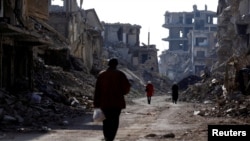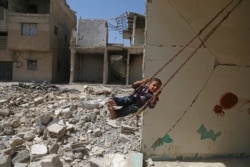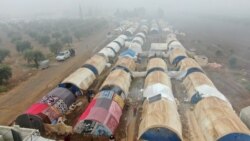Leaders of the International Red Cross and Red Crescent movement warn the suffering of millions of Syrians is deepening as the country enters a second decade of warfare, with no political solution to the crisis in view.
Syrian civilians continue to suffer amid a multitude of crises — ongoing hostilities, gross human rights violations, a shattered economy, chronic hunger and the COVID-19 pandemic.
The International Committee of the Red Cross reports about 13 million people, or nearly three-quarters of Syria's population, now rely on international humanitarian aid for survival — a 20 percent increase over a year ago.
ICRC President Peter Maurer says the population is subject to atrocities, many that breach international humanitarian law. These include disproportionate attacks in urban areas and the targeting of civilians and civilian services, such as ambulances, water stations and markets.
"There are other conflict situations in the world where we see heightened violations and the civilian toll," he said, adding that the level of destruction in Syria over the years makes it an extraordinary place because of the flattening of the cities, and the number of those displaced and disappeared.
Khaled Hboubati, president of the Syrian Arab Red Crescent, leads more than 13,000 volunteers and employees, who he says suffer the same miserable living conditions as everyone else. Sixty-five of his volunteers have died while providing life-saving assistance to civilians.
Speaking on a video link from Damascus, he says humanitarian action is severely hampered because of lack of money and international sanctions.
"No food parcels or health care can be delivered. … Sanctions also have an effect on importing medical equipment, supplies and medicine. … The humanitarian process is stumbling due to the lack of the fuel needed for the ambulances, power station, generator for the hospital and the blood banks," Hboubati said.
Francesco Rocca, president of the International Federation of Red Cross and Red Crescent Societies, says the immense humanitarian needs across Syria are being exacerbated by the coronavirus pandemic.
"For most Syrians, worrying about COVID-19 is a luxury they cannot afford," he said. "There are many places where keeping physical distance or wearing a mask is not a personal choice like us here in Europe. It is only simply impossible."
The Red Cross and Red Crescent leaders are appealing for international support. They note donations are declining despite Syria's worsening humanitarian situation, and urge the global community not to abandon the Syrian people.






